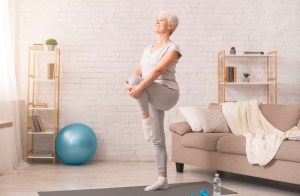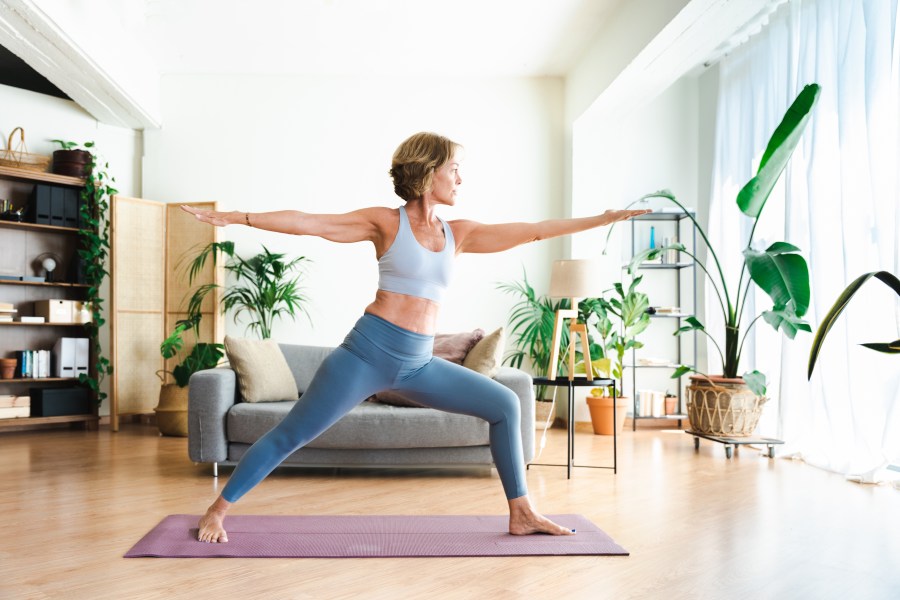Keeping up with exercises to improve your balance is important for both our mental and physical health, as it not only improves our general fitness levels, but can give us more independence as we age by giving us better stability and control over our bodies.
As we age, it is important to continue to build and maintain strength so we can continue to do the things that positively impact our lives, such as socialising, hobbies and maintaining independence. Samantha Thom, an independent physiotherapist working with care home KYN BICKLEY and specialising in later-life holistic care, has worked extensively with older residents to improve their balance and strength, re-engage with exercise and eventually walk again.
She has created some top tips to try at home to help you stay agile, drawing on tips, classes and exercises KYN practises and encourage in its own homes.
‘In terms of exercises you can do by yourself, at home, there’s plenty to choose from! Here are my favourites – great places to start and the ones I love encouraging at KYN. If you repeat each exercise 10 times, your balance will naturally begin to improve. The exercises can be varied and adapted to your personal abilities and levels.’
Exercises to improve your balance from home
Sit to stand
Sitting in a chair, ensure your feet are flat on the floor and brought back, so your calves are touching the chair legs. Lean forward slightly and stand up straight, and slowly lower yourself back down – ensuring the backs of your calves are still touching the chair legs. If required, you can use your hands on the arms of the chair to help control this movement, but try to use them as little as possible.
Heel raises
Stand tall, holding a support with one or two hands as needed (the kitchen sink would work). Lift your heels off the floor, taking your weight onto your toes. Hold for three seconds, then lower with control.
Toe raises
Stand tall, holding the same support and raise your toes – taking your weight on your heels. Don’t stick your bottom out. Hold for three seconds, then lower with control.
One leg stand
Stand close to your support and hold it with one or two hands as needed. Balance on one leg, keeping the support knee soft and your posture upright. Hold the position for 5-10 seconds, and repeat on the other leg. Try to reduce the amount you use your hands for support as you practise this exercise.
 How to improve your balance: more exercises to try
How to improve your balance: more exercises to try
Heel-toe stand
If you need to use both hands for support when doing the one-leg stand, do not try this one:
Stand tall, with one hand on your support. Put one foot in front of the other to make a straight line and look ahead. If you can, raise your hand off the support (keeping it within reach) and balance for 10 seconds. Take the front foot back to hip-width apart. Then, place the other foot in front and do the same on this side for another 10 seconds.
Yoga & Pilates
Yoga can help deepen your meditation practice, improve your flexibility, and help with balance. Pilates is another great choice for balance, especially if you’re recovering after injury, as well as improving posture and core strength.
Get up & out
If you experience a fall, it can be daunting to get moving again, which can lead to social isolation and other health-related problems. But, I’d encourage anyone to go for walks when they can. You can also take it a step further by getting out and doing exercise, as feeling better physically has been proven to positively impact how you feel mentally.
Two-for-one exercises
Building your strength is important at any age, and resistance training, or adding small weights to any exercise, is a simple way to achieve this. It keeps bone density higher, which helps improve strength, and can also protect your joints from injury, contributing to better balance. Contact a physiotherapist or your local gym for advice on appropriate exercises.
Balance is vital when it comes to confidence – if you’re feeling steady on your feet, you’re more confident to get up, move around and get out of the house, which naturally positively impacts mental wellbeing.
For more information, please visit www.kyn.co.uk.








